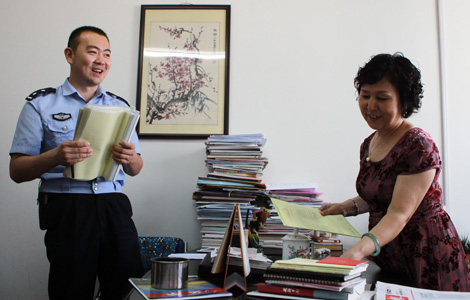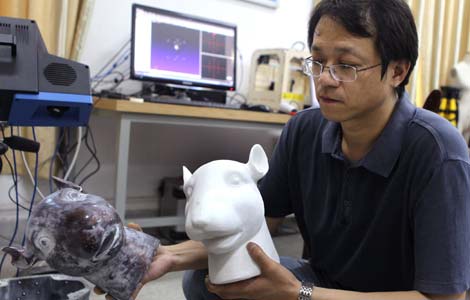From the Chinese Press
Updated: 2013-08-14 07:55
(China Daily)
|
||||||||
Longevity depends on lifestyle
As home to a significant number of centenarians, Bama Yao autonomous county in the Guangxi Zhuang autonomous region has attracted many visitors as well as property developers. The remote, mountainous county, despite some elements' attempt to capitalize on its new-found fame, shows how a simple but active lifestyle and a healthy environment make all the difference in longevity, says an article on gmw.cn. Excerpts:
More than 30 of every 100,000 people in Bama are centenarians, which is a fairly high ratio. Fascinated by the secrets of longevity in Bama, thousands of people, including terminally ill patients, have flocked to the remote county in recent years to collect local spring water and breathe the fresh air at the entrance to limestone caves. Some people crawl up the mountain slopes, believing the exercise to be the best way of absorbing energy from the soil.
Besides, apartments marketed as conducive to preserving health have sprung up across the county, with rents ranging from 500 yuan ($82) to 2,000 yuan a month. Even the operating rights of a local limestone cave have been contracted out, and visitors have to pay 70 yuan for a single visit, and a monthly pass costs 300 yuan.
But despite this uncalled-for intrusion, local people continue to live a frugal and humble life. Of course, clean water, fresh air and a healthy diet are the secret of their longevity. People in Bama live longer also because they follow an easy, simple and tranquil lifestyle.
Outsiders come to the bucolic refuge to find a way out of their anxiety, and search for peace and health in a short time. But the very manner in which they try to attain this - success in a short time - contradicts the original purpose.
Rash behavior of air passengers
A flight from Chongqing municipality to Shijiazhuang, capital of Hebei province, was delayed for more than one hour recently because five first-class passengers refused to board the plane and adopted radical means to prevent its takeoff. Though security officers detained them later, they didn't charge them with disturbing airline services, which is cause for concern, says an article in Beijing Times. Excerpts:
Flight delays have become common in China. According to FlightStats, a US-based provider of data on air travel, 82 percent of the flights from Beijing and 71 percent from Shanghai were delayed in June. The two cities rank at the bottom of 35 major international air travel hubs that were surveyed for flight delays and cancellations.
Air traffic control problems and bad weather are the two most common causes of flight delays in China. But in some cases, like the recent incident in Chongqing, passengers are to blame.
The five first-class passengers in Chongqing refused to board the plane because they were not ferried on an "exclusive bus" to the plane, and after the cabin door was closed, they wrapped their arms around the wheels of the towing vehicle. If they were unhappy with the airline's services, they should have negotiated with its staff instead of resorting to radical means and infringing upon the rights of other passengers.
In similar incidents in Kunming and Guangzhou, passengers were held for abusing their rights and disrupting public order. The same treatment should have been meted out to the five passengers in Chongqing, but they were allowed to go scot-free, which is a disturbing development.
(China Daily 08/14/2013 page9)

 PetroChina poised to dominate Iraqi oil
PetroChina poised to dominate Iraqi oil
 Printed bones
Printed bones
 Marriage attitudes slowly change
Marriage attitudes slowly change
 On frontline of fight against crime
On frontline of fight against crime
 Bird flu, slowdown hit sales at fast-food chains
Bird flu, slowdown hit sales at fast-food chains
 Apartment owner told to dismantle roof-top oasis
Apartment owner told to dismantle roof-top oasis
 Highlights from 2013 China-Russia drill
Highlights from 2013 China-Russia drill
 Billionaire unveils 'Hyperloop' transport system
Billionaire unveils 'Hyperloop' transport system
Most Viewed
Editor's Picks

|

|

|

|

|

|
Today's Top News
Friends of accused Boston bomber due in court
Economic hub on Bohai Bay
Chinese as assistant secretary-general
Hot times mean hotter prices
Donors of organs easing transplant shortages
China sees worst heat in half-century
Printed bones
Weather bears down on rice
US Weekly

|

|




